Feature Stories
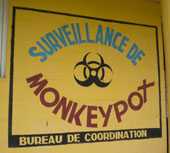
Sign for monkeypox surveillance in DRC
DHCPP’s Efforts to Combat Monkeypox in the Democratic Republic of Congo
Since 2010, Poxvirus and Rabies Branch’s poxvirus experts have made more than 20 trips to the Tshuapa District in DRC. Teams have trained more than 200 healthcare workers on infection control practices, disease recognition, and the collection of diagnostic samples.
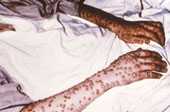
Name that rash.
Name that Rash: CDC’s Smallpox Experts, the Laboratory Response Network, and State Epidemiologists Work to Strengthen Emergency Preparedness
CDC’s smallpox experts and the Laboratory Response Network create mock scenarios of smallpox-related events to train and test lab workers and epidemiologists across the country. This engagement and coordination showed marked improvements in how states would respond in a smallpox emergency.
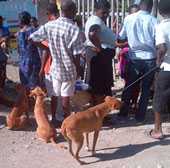
Community members bring dogs for vaccination during the vaccination campaign in Archaie.
Stopping the Spread of Rabies in Haiti: CDC Partnership Succeeds at Saving Lives
The Haiti Animal Rabies Surveillance Program (HARSP) recently witnessed a significant success in Haiti with a fast, efficient, locally driven response to a potential rabies outbreak, likely saving lives. The fact that the CDC rabies team was not in Haiti at the time and had no immediate involvement speaks to the program’s success demonstrating the local adoption of rabies awareness, detection, and response.
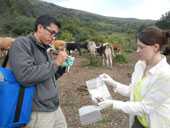
Neil Vora and Ginny Emerson collect blood samples from cattle in the country of Georgia for orthopox testing.
Thinking Outside the Cowpox: The Discovery of a Pox-Related Virus
After a 2012 visit from the CDC Poxvirus Team, health officials in the country of Georgia knew to look out for cowpox among residents of the region, which sits on the Black Sea and is bordered by Turkey, Armenia, Azerbaijan, and Russia.
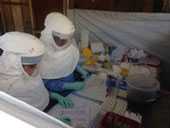
Bandy Russell and Aridth Gibbons work inside the field lab.
Improving Ebola Diagnostics: Field Lab in Bo, Sierra Leone
When the Ebola outbreak in West Africa began in spring 2014, laboratorians in DHCPP’s Viral Special Pathogens Branch were well prepared with the unique familiarity of the Ebola virus that comes from years of laboratory research and lessons learned from past field laboratory responses.
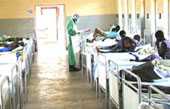
Infected and convalescent patients treated in a Gulu isolation ward in Uganda 2000.
15 Years of Ebola Research Prepared Them Well
DHCPP lab staff have helped stop several outbreaks of Ebola and Marburg viruses in Africa through quick deployment of field laboratories. That experience has prepared them for responding to the current outbreak in West Africa.
- Page last reviewed: July 17, 2015
- Page last updated: July 17, 2015
- Content source:
- Maintained By:


 ShareCompartir
ShareCompartir